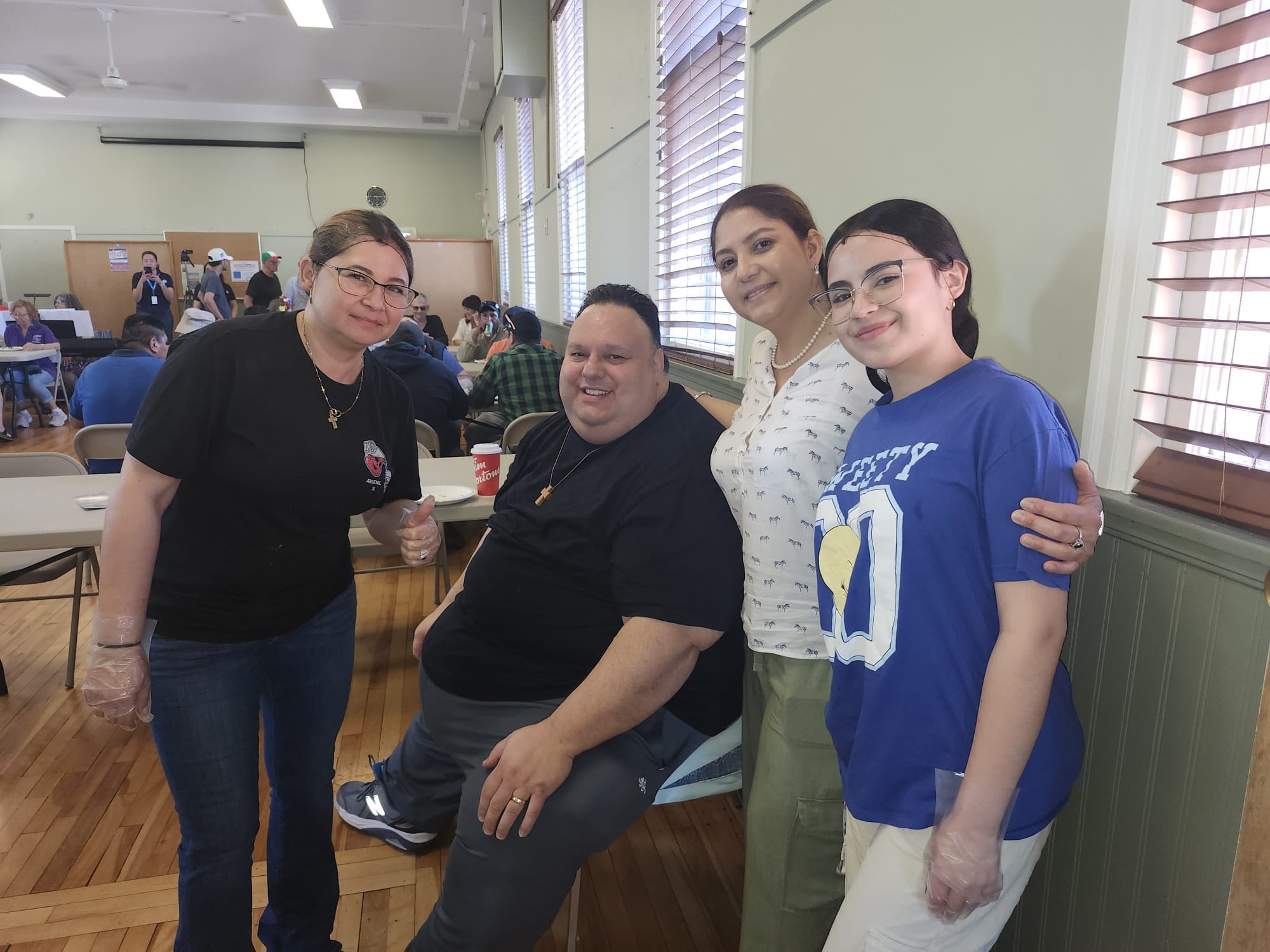“Hola!” I hear as I walk down the steps at the back of St. Alban’s in Beamsville. I’m greeted by the delicious smell of food and the volunteers behind the kitchen counter. It’s my first time visiting the Migrant Farmworkers Project at the St. Alban’s hub.
Everyone is so friendly and welcoming. Both the volunteers and the farmworkers. I was there to meet the Reverend Peter Ciallella, the newly ordained missioner for the Migrant Farmworkers Project. Ciallella is sitting at a table by the door, a perfect spot to welcome in the workers and engage with the volunteers.
Everyone seems very happy, and I am surprised to learn that some of the volunteers only speak English. Still, I watch as they communicate with the Spanish-speaking workers they are there to support, grateful for the work they provide for our communities. I can see the relationships that they have built despite the language barrier—proof of God at work.
There were freshly made, prepackaged meals lined up on the counter so workers could choose to eat in the café, outside, or take them to go. Many showed up in groups and preferred to stay and enjoy the community.
After touring the hub, speaking with the volunteers and meeting some of the migrant farmworkers, I had the opportunity to speak with Ciallella to learn more about his role and the work of the Migrant Farmworkers Project.
Dani: Peter, for those who haven’t met you yet, can you introduce yourself?
Peter: Sure, my name is Peter Ciallella. I was born and raised in Hamilton, Ontario. My parents immigrated to Canada from Italy in 1966. I became the missioner for the Migrant Farmworkers project on April 1st, 2025.
D: For those who haven’t heard about the Migrant Farmworkers Project, can you share what it is?
P: The Migrant Farmworkers Project is a mission of the Anglican Diocese of Niagara that has existed for approximately 13 years. It is a response to the growing needs of the migrant farmworkers in the Niagara region. Through collaboration with other non-profit agencies, we provide a space of welcome and service for the specific needs of the migrant workers, such as hospitality, clothing, bicycles, medical clinic, translation services, ESL, education and workshops on a range of topics such as migrant workers’ rights and health and safety. We also give spiritual support and counselling to many as they strive to make a livelihood for themselves and their families back home, despite the moments of loneliness and mental strain they are forced to endure.
D: Can you elaborate on some of the programs that run for the farmworkers?
P: Each week on Thursday, we open the hub at St. Alban in Beamsville. We also run a separate hub once a month on Tuesday from the public library in Fenwick. The workers come to socialize while we provide snacks, refreshments and a light meal. We give them access to Wi-Fi. They receive a welcome bag at the beginning of the season (March/April). Twice a month, there is a medical clinic on-site that provides primary care, referral, bloodwork, etc. A translator is available to facilitate communication between the patient and the medical provider. There is a series of workshops on different topics such as income tax, migrant workers’ rights, health and safety. We provide ESL tutoring for those inclined to improve their English. We have an online educational program for adults that was designed in Mexico and is available to the workers. We have donated clothing on site, and we sell donated bicycles at a modest cost ($40) to cover the cost of servicing the bikes.
I also visit the workers on the farms, especially those who are unable to attend our weekly gatherings. I engage in a conversation with the workers and provide spiritual service. We also have Eucharist both at St. Alban’s Church in Beamsville and St. John’s in Jordan.
At times, I have been asked to assist with translation or help with transportation so that a worker can attend to their medical appointments.
D: So, Peter, how did you get involved in this project? What was the experience that made this role a good fit for you?
P: I’ve been a long-time missioner for migrants in various roles. I’ve always held a special place in my heart for them. Most likely from my own background in an immigrant family. I see what migrants must endure while adapting to a new culture and society. I personally began ministering to migrant farmworkers in 2010. I continued to serve them while I was a rector in various parishes within the region.
D: What has your experience so far been like with the project?
P: I have come to appreciate and value very much the work that has been ongoing in terms of service and support for our migrant workers. So, I would say the experience has been very positive. My wife, Sandra, is also fully committed as a volunteer in the project.
Speaking of the volunteers, I truly admire the dedication and care of the volunteers at St. Alban in Beamsville and the wider community. They provide so much support for the mission.
I am also grateful to the leadership of the diocese, beginning with Bishop Susan and the Reverend Ian Mobsby, the community missioner, for their ongoing support, guidance and encouragement.
D: What are the goals for the future of the Migrant Farmworkers Project?
P: In addition to providing the ongoing support and services to our migrant farmworkers, the other goals include the following:
1. Establishing a community for newcomers to Canada from Latin America and connecting that community with our migrant Farmworkers.
2. Build up the spiritual dimension of the mission through worship, retreats, and formation
3. In the past, the Project largely depended on the vision and direction of the Missioner. We want to use a collaborative, team approach that includes the input from the leadership of the Diocese to the local leaders in the parishes. Therefore, soon we will establish an Advisory Board to give the Missioner the support he or she needs to implement the vision of the mission in line with the Mission Action Plan of the Diocese.
When I left, I was encouraged to take a meal, and the workers left behind a basket of pears as a symbol of gratitude. I was humbled at the long hours these workers put in to harvest the food we often take for granted in our regional grocery stores. Yet here they are thanking me for sharing about the work done at the Migrant Farmworkers project.
Ciallella later said he and his wife, Sandra, had also begun to connect with more women workers. During his time here, he and Sandra had found that there was a need to make sure that women knew that this was a safe place for them as well and identified that a community was needed to support the women who were here working seasonally also.
The hub often accepts donations to ensure it can support enough of the workers consistently. At the time, I was visiting, personal hygiene products were scarce. This can include things such as pads, tampons, shampoo, body wash, skin care products, etc. They also accept donations of seasonal clothing, and new underwear and socks were items that were also of great need. You can contact the Reverend Peter Ciallella to learn more about what donations are needed or how you can support and volunteer at the Migrant Farmworkers project by emailing [email protected].
Update October 1st
Bishop Susan Bell, with the approval of Synod Council, has designated the Migrant Farmworkers Project to be a diocesan mission, effective October 1. To read more about this designation, visit https://niagaraanglican.ca/news/migrant-farmworkers-mission-designated


Viewing 2026 Through a Different Lens